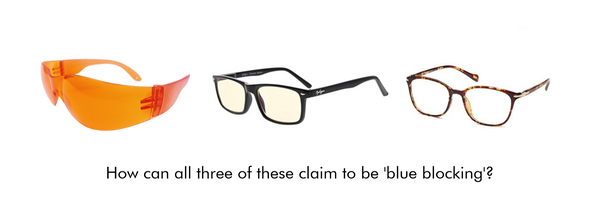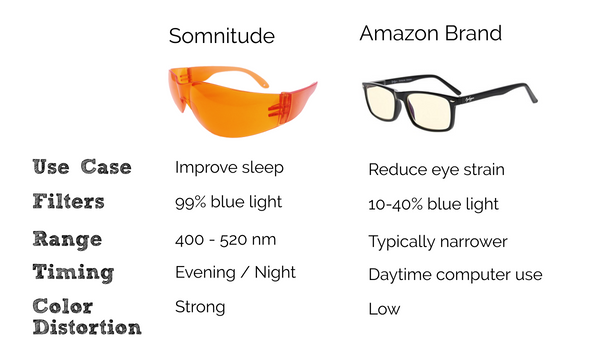Why are there different types of blue blocking glasses (Orange blue blockers vs. Clear blue blockers?)
Posted by Blue Block Glasses Team on August 27, 2018 . 0 Comments
We often receive emails that read something like this;
‘I bought blue blocker glasses on Amazon’ or ‘My optician put on a coating to remove blue light. Yet when I do your blue blocking filter test, both images don’t appear the same. Did I get scammed? Do my glasses actually filter blue light’
Different types of blue blocking glasses exist for different reasons. An important consideration for you is; why do you wear blue blocking glasses?
- I wear blue blocking glasses to protect my eyes and prevent eyestrain from looking at the computer all day. I’ve heard that looking at screens is destroying my eyes.
- I wear blue blocking glasses to improve my sleep.
*Note there are other uses, such as for migraines, driving or clarity, but we will focus on these above 2 cases in the article*
You need different types of glasses depending on your answer to this question. So think hard – do some research and continue reading. Let’s start by asking a basic question?
What defines 'blue blocking'?
Unfortunately there is no consistent definition of a blue blocking lens. At it’s most general, the term means that some degree of blue light is filtered out. However, without any further information, the term is not helpful.

There are two key things to consider; range of filtering and transmission. The range denotes the actual wavelengths of light being filtered. For example some glasses filter light between 400 - 450 nm. The transmission indicates how much of that specific wavelength band is filtered. So for example, is it 50% filtering? Or 30% filtering?
For example, Somnitude's line of Blue Blocking Glasses for sleep, the range is 400 – 520 nm and transmission is less than 1% in most bands. Now that we know what to look for, let’s take a look at blue light.
Is blue light bad?
It depends. Exposure to the right amount of blue light, at the right times is very healthy. Exposure to the wrong amount of blue light, at the wrong times is bad.
What is the right amount at the right time? Let’s start with timing. Blue light exposure during the morning and afternoon is very important. It signals daytime to the circadian system and thus helps prepare you for the day. Blue light during the day keeps you alert and increases cognition. It’s a natural form of coffee. A reduction of daytime light in northern areas during winter, leads to increased rates of depression and suicide. This is why SAD lights have a very high blue component in them.
What is the right amount of blue light? This is tricky. It appears our eyes have pretty good defences against blue light when that source of light is indirect. Consider the sun. The sun is extremely bright. During a clear day, our eyes can remain comfortable at intensities up to 100,000 lux (think of a green field under a blue sky). So it’s not necessarily the intensity – it’s more dependent on the directness of the source. There are some other factors such as brightness, color, perception and sensitivity but we won’t go into these topics.
Contrast this type of exposure with light emitting electronic devices. With computers we are looking directly into backlit LEDs which are less than 2’ from our eyes. With phones, the light sources are often even closer. Though the intensities are far lower, it appears that looking directly into light emitting sources is part of the problem when it comes to eye health.
The effects of sustained close range exposure to high energy light is still uncertain. A recent study found that exposure to blue light over time can increase the risk of macular degeneration – a very severe problem. Another problem could be retinal damage. Widespread use of bright backlit devices is still a relatively recent phenomenon. We likely won’t see the full effects for decades.
Should I just block all blue light?
As mentioned previously, blue light during the day serves a very important purpose. Although looking at screens and phones for 12 hours a day is probably a bad idea, filtering all blue light during the day could likely cause a weakening of environmental signals required to maintain a healthy circadian system.
People buying prescription glasses with blue blocking filters (popular gaming glasses or computer glasses) are especially problematic. These filters – though useful for computer work, are not helpful from a circadian perspective. From a circadian perspective, most people that work indoors already likely receive too little blue light. For these people, filtering all blue light could result in a weakened circadian system output. This in turn could exacerbate problems of wake and sleep.
How do I protect my eyes during daytime computer work?
Most glasses that filter blue light for computer work or screens filter somewhere between 10 – 30 % of light within the range of 440 – 480 nm. These glasses are typically clear with a hint of yellow or have a reflective blue light coming off them. These glasses are generally sold by opticians to those looking to protect their eye health, or on Amazon marketed as gamer or computer glasses.
During the day time, unless you have been told by your opthamologist, you should generally not be using total blue filters (as described below).
If you don't want to wear blue light filtering eyewear during the day, you can consider options to protect your eye health. Options such as ; reducing intensities on screens, using software to reduce blue light and physical filters on screens. These have the benefit of just filtering screens while allowing your eyes to be exposed to natural blue light.
It should be noted that actual range and transmission can only be measured with a spectrometer and so claims from sellers should be taken with a grain of salt.
What type of glasses should be used for the evening?
Your eyes become very sensitive to light at night time. Small changes within the eye make it possible for the eye to detect very low intensities of light. Exposure to even a small amount of blue light (50 lux) disrupts the production of melatonin and delays the onset of sleep. As such, you want to filter all blue light at night. For this, you need glasses which are proven to filter 99% of the full spectrum of blue and high energy wavelength light.
Blue blocking glasses like those made by Somnitude, filter 99% of blue light and are ideal for evening use.
In summary; orange vs. clear blue blockers



Post Comment.